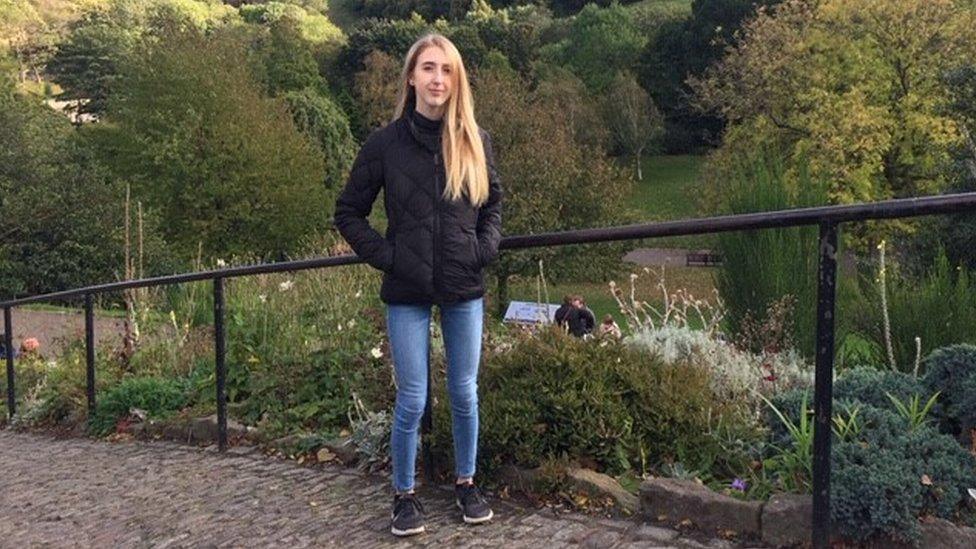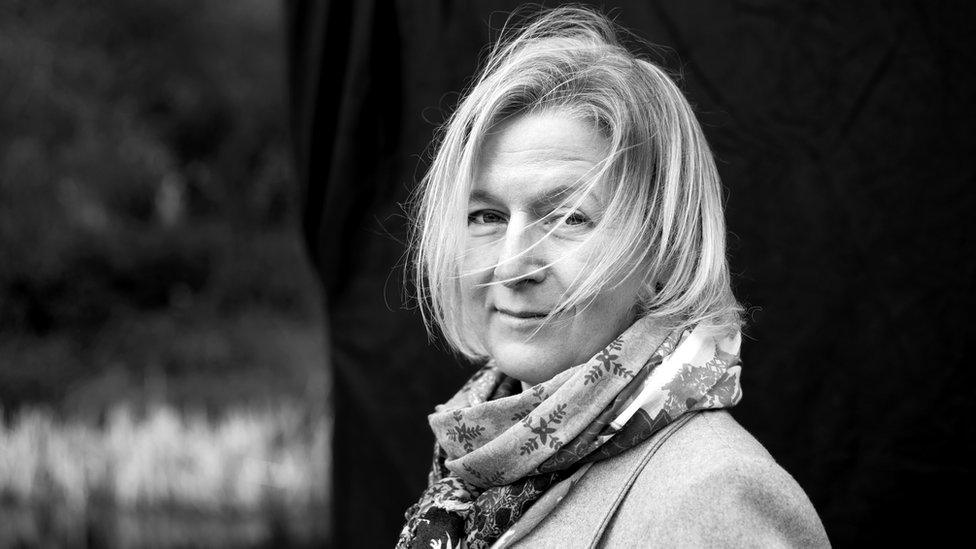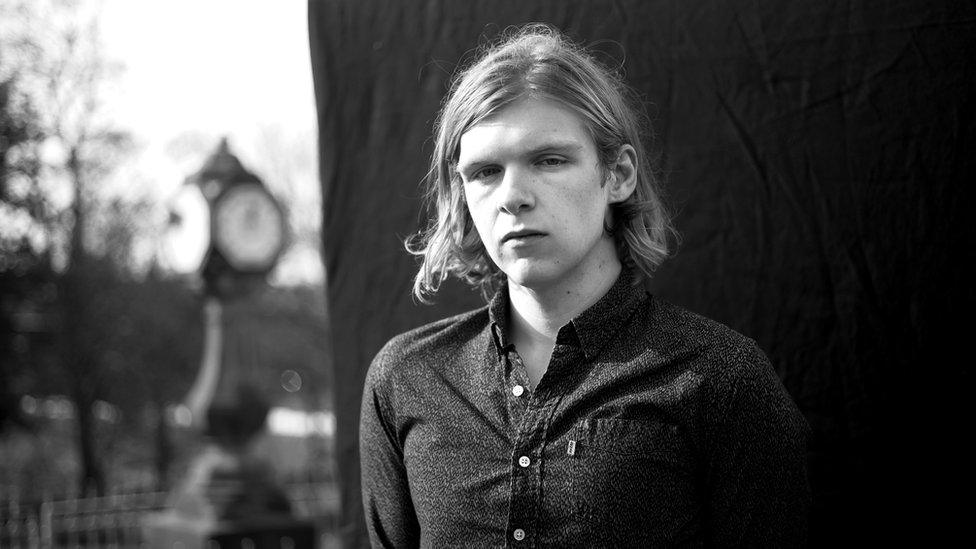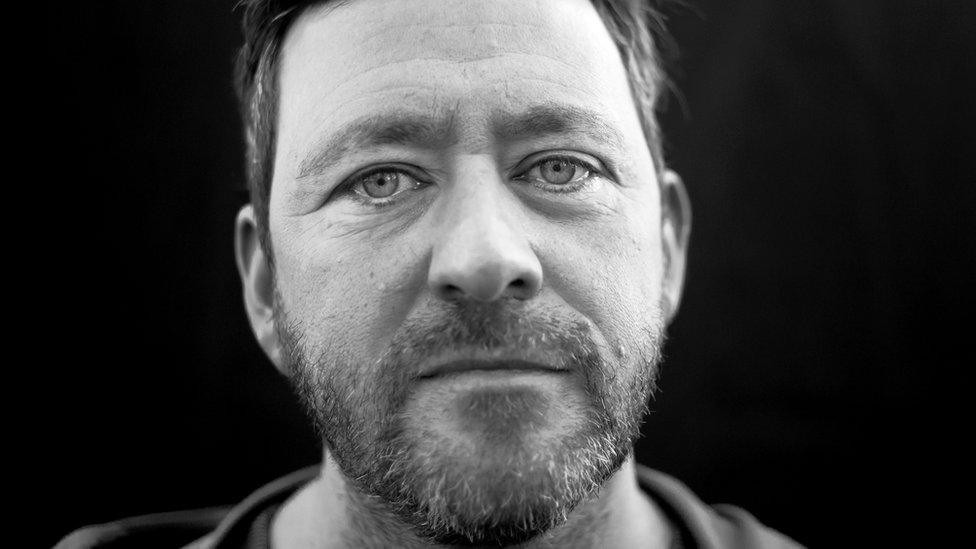'She did not get the anorexia help she needed'
- Published

Maddy Wallace went to the University of Edinburgh in 2018
People living with an eating disorder and their families should be offered greater support, according to a aScottish government review of services., external
The clinicians and psychologists who led the review said that seven of Scotland's health boards had been an 86% increase in referrals for eating disorders over the last year. Figures also showed a 220% jump in paediatric admissions at two regional adolescent in-patient units.
Their report made 15 recommendations including self-help packages, peer support networks and emotional and practical support for families and carers as well.
Ahead of the review's publication BBC Scotland's The Nine spoke to three people dealing with the devastating nature of the illness.
Christine Reid's daughter Madeline Wallace died from anorexia in January 2018.
The 18-year-old from Peterborough had been studying medicine at Edinburgh University when she became gravely unwell. An inquest into her death found that she "rapidly lost weight" during her first weeks as a student.
"It was very strange," Ms Reid says. "It was almost like watching someone disintegrating from the inside out. It is a horrible illness."
Maddy's mother says her daughter was "a lovely person" who had lots of friends and wanted to be a doctor.
"She got this illness and she really didn't want to have it but she couldn't see a way to recover from it," Ms Reid says.
"She just didn't feel like she got the help she needed."
In December 2017 - at the end of her first term at university - Maddy returned home where she was diagnosed with a muscular-skeletal issue.
She became seriously unwell with chest pains and was rushed to Peterborough Hospital. She died just days later due to complications from sepsis.
Her death came less than a month after leaving Edinburgh.
She had previously been treated for the eating disorder through Child and Adolescent Mental Health Services (CAMHS) in England during her teenage years and had also spent time as an inpatient at a eating disorder unit in hospital in Cambridgeshire, but found it difficult to access help in Scotland.

Christine Reid's daughter Maddy died in 2018
Ms Reid had asked for a treatment plan to be set up in Edinburgh to support her daughter in her studies but was told that treatment could not be put in place before Maddy had registered with a GP in the city, something she was unable to do until she arrived.
She was then added to a waiting list for adult eating disorder services at Edinburgh's Cullen Centre and faced delays in access to treatment.
Ms Reid says: "It felt to her that it was starting from scratch. She was having to explain what monitoring was needed, what treatment she'd received already and what needed to happen.
"Her GP notes (from Peterborough) didn't arrive at her GP (in Edinburgh) until she had left Edinburgh."
"She wanted to be a doctor so she had a really good understanding of what was going on with her, she just couldn't help herself. I think she felt quite disillusioned with the facilities on offer and felt they weren't helping her."
An independent review in to Maddy's death made 14 recommendations for changes to eating disorder care at a national and regional level including advice for GPs on anorexia complications.
"It feels like if lots of different decisions had gone different ways it could have been avoided and that is hard to take," her mother says.
'Men already find it hard to open up about mental health'

Connor Spratt went to his GP for support
Connor Spratt struggles started when he was forced to diet in order to meet a weight requirement for boxing bout in late 2018.
The 22-year-old student says that process eventually led to a cycle of consistently restricting his food and he was diagnosed with bulimia in 2019.
"People on the outside would think I was dedicated to the sport but actually I was detracting socially," he says.
"I didn't want to go places, I stopped becoming interested in university, and everything became focused on food."
Connor went to his GP for support and was diagnosed with bulimia but a long wait for treatment led him to get private counselling.
He says: "Men already find it hard to open up about mental health any way, so then when you throw in to the mix having to talk about an issue that society tells them only women suffer from, that leaves them feeling even more emasculated.
"We don't have a lot of education on how men suffer with eating disorders and I think that leads to a lot of men not discussing what they are going through.
"I also think a lot of men are suffering without realising that they are suffering."
Connor says a lot of the symptoms are "entrenched" and seen as a normal part of the male experience such as the gym culture.
He ended his private treatment in 2019 but found that his struggle with bulimia returned during lockdown.
Connor says: "I had to come to terms with what was actually going on with me, 'why do I feel anxious when I can't work out? Why do I feel anxious that the gyms have closed?'."
In the past few weeks he has referred himself to Edinburgh's eating disorder unit, The Cullen centre, for more support. He does not know how long he will have to wait.
'It's really hard hard to be optimistic'

Rob's daughter was diagnosed with the illness in 2019.
Rob's daughter is currently being treated for anorexia at a young person's unit.
The 16-year-old - who we're not naming - was diagnosed with the illness in 2019.
She was first admitted to hospital in April 2020, shortly after lockdown began. She had struggled to cope when her weekly face-to-face treatment was moved online due to the pandemic.
The teenager was able to return home in September and managed her recovery until November, when she was re-admitted after her health deteriorated once more.
Rob told BBC Scotland: "The only bed available that day was in Glasgow which is 110 miles away from us. It all happened very quickly, the decision was made that she was heading back to hospital."
Rob and his wife were forced to travel to Glasgow daily for 10 days before a bed became available closer to home.
He gave evidence as part of the Scottish government review and would now like to see more localised support for those suffering from eating disorders.
"With any other serious illness, a life-threatening illness, you would have a treatment plan but with anorexia there's nothing," he says.
"It's just a waiting game. That's what's so difficult; there's no cure, there's no roadmap. You're just left dangling every day."
"It's hard to be optimistic, it's really hard to be optimistic. There's no magic wand and no magic treatment."
You can watch a full report on this on The Nine on the BBC iplayerthe BBC Scotland channel at 21:00..
Related topics
- Published3 September 2020
